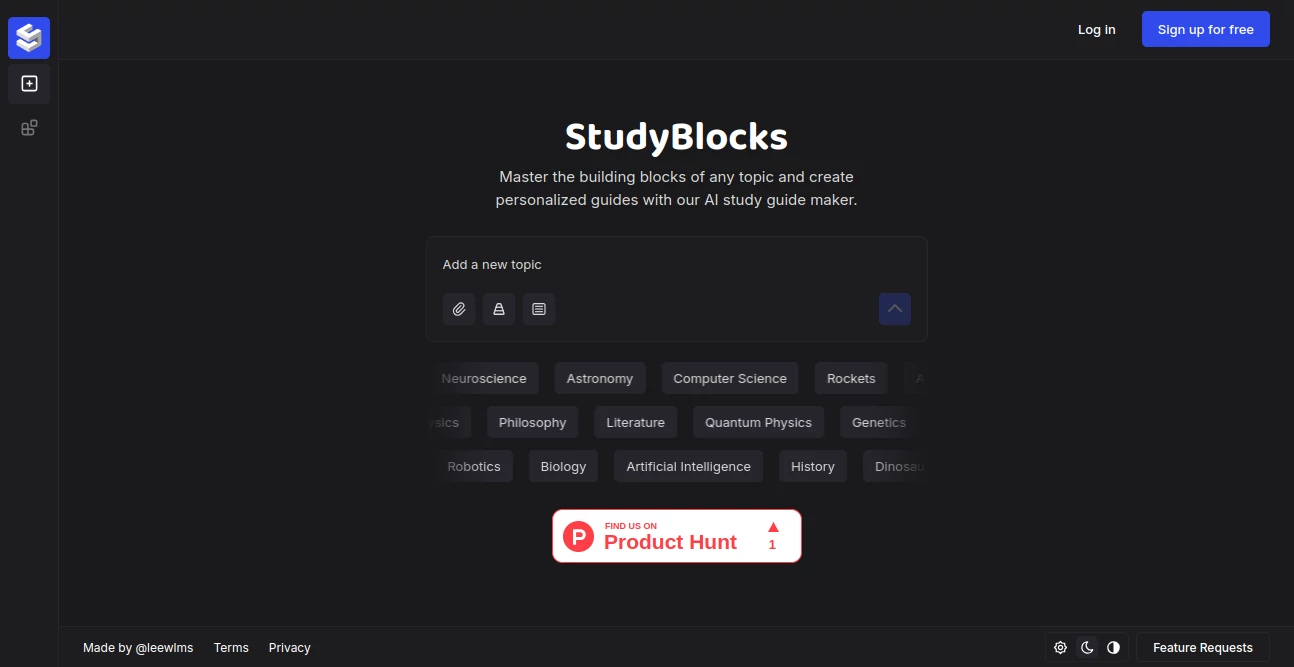🧠 AI Quiz
Think you really understand Artificial Intelligence?
Test yourself and see how well you know the world of AI.
Answer AI-related questions, compete with other users, and prove that
you’re among the best when it comes to AI knowledge.
Reach the top of our leaderboard.
Studyblocks
Craft Custom Study Guides with AI Ease

What is Studyblocks?
StudyBlocks slips into the life of any learner like a well-worn notebook, but with a twist that turns scattered notes into focused roadmaps for acing exams. It's the kind of tool that listens to what you're cramming—be it organic chem reactions or macro econ theories—and hands back bite-sized blocks of wisdom that stick. Students from high school labs to grad seminars have turned to it during crunch times, often crediting those quiet midnight sessions where it helped untangle a knotty concept just when the coffee ran dry.
Introduction
StudyBlocks grew out of a founder's own battle with overwhelming syllabi back in college, where flipping between textbooks and flashcards felt like herding cats. They dreamed up a way to slice big topics into manageable chunks, launching it quietly to a handful of study groups before it caught fire on forums full of bleary-eyed undergrads. Fast forward, and it's become a whisper among overachievers who swear by its knack for making dense material feel approachable, like chatting through it with a patient tutor who never tires. What draws people in is that subtle shift from rote memorization to real grasp, turning what could be a grind into something almost enjoyable.
Key Features
User Interface
You land on a dashboard that's as uncluttered as a fresh planner, with a central prompt box that invites you to spill your topic or paste a syllabus snippet. Options for depth and format unfold like an accordion—simple toggles for flashcards or timelines—without burying you in submenus. As results build, they stack in colorful cards you can drag and drop, rearranging on a whim, and the whole thing hums along on any device, feeling just as natural on a phone during a bus ride as on a laptop sprawl.
Accuracy & Performance
When you feed it a chapter outline, the breakdowns come back laser-sharp, pulling from trusted sources to ensure every fact lines up without fluff or filler. It processes even hefty subjects like quantum mechanics in under a minute, keeping your study sprint unbroken. Testers from various fields rave about its reliability—rarely a dud explanation that needs a full rewrite—making it a steady hand when deadlines loom and doubts creep in.
Capabilities
Beyond basic summaries, it carves out interactive quizzes that quiz you on weak spots, or mind maps that link ideas across chapters for that big-picture view. You can import docs to personalize, blending your highlights with fresh angles, and export packs ready for print or app sync. It even suggests review schedules based on what you've flagged tough, turning passive reading into active recall that builds long-term retention.
Security & Privacy
Your study notes stay in a personal vault, encrypted end-to-end so no one sneaks a peek at your half-baked thesis ideas. It doesn't hoard data beyond your session unless you opt to save, and sharing means you pick exactly what goes out—maybe just a quiz link for group prep. Compliance with student privacy norms keeps it above board, letting you focus on the material without the nagging worry of where your work wanders.
Use Cases
Med students distill dense pathology texts into daily digest cards, quizzing themselves on shifts between rounds. History buffs weave timelines from lecture rambles, spotting patterns that make essays pop. Language learners break grammar rules into themed blocks, practicing dialogues that feel conversational. Even working pros refresh cert prep, carving out weekend warriors from full-time loads, proving it's as versatile for lifelong learners as it is for campus crammers.
Pros and Cons
Pros:
- Transforms walls of text into scannable, memorable bites.
- Free core access hooks you without the wallet hit.
- Quizzes adapt to your stumbles, sharpening focus where it counts.
- Exports clean for any study setup, from apps to binders.
Cons:
- Relies on clear inputs—vague prompts yield fuzzy results.
- Premium unlocks like team shares sit behind a pay bump.
- Best for structured subjects over freewheeling arts.
Pricing Plans
The basics roll out gratis, covering unlimited guides for solo scholars with no sneaky limits. Upgrade to scholar tier at nine bucks monthly for collab folders and advanced exports, or go group at nineteen for classroom shares and analytics on progress. Annual swings save a bundle, and a full week's trial lets you road-test the extras before any commitment, keeping entry low and options open.
How to Use StudyBlocks
Sign up with an email, then drop your subject into the generator—say, 'photosynthesis basics'—and pick your flavor, like flashcards or outlines. Review the blocks, tweak any off notes, and hit quiz to test yourself right there. Save the set to your library, set a reminder nudge, and revisit for spaced reps. It's a loop that builds as you go, turning one-off sessions into a steady study rhythm.
Comparison with Similar Tools
Where flashcard apps stick to rote drills, StudyBlocks layers in context that connects dots, though those might suit pure memorizers better. Against full note-takers, it's punchier for quick preps, skipping endless scrolls for targeted hits. It edges out general summarizers by tuning to learning styles, offering a study-specific spark where others play broad and shallow.
Conclusion
StudyBlocks quiets the chaos of cramming, handing you tools to build understanding that lasts beyond the test. It's a reminder that learning thrives when it's broken down just right—not too big to scare, not too small to bore. As syllabi keep stacking higher, this little engine keeps chugging, turning 'I can't' into 'I've got this' one block at a time.
Frequently Asked Questions (FAQ)
Can it handle my weird niche topic?
From astrophysics to ancient runes, it pulls wide but shines brightest on core academics.
How customizable are the outputs?
Edit freely—add your spins, delete duds, or regenerate sections till it fits like a glove.
Does it work offline?
Core creation needs a link, but saved packs sync for anytime review.
Is there a mobile version?
Fully responsive, so your phone becomes a pocket tutor on the go.
What if I share with study buddies?
Pro lets you link folders for group edits, turning solo prep into team triumphs.
AI Knowledge Management , AI Quizzes , AI Education Assistant .
These classifications represent its core capabilities and areas of application. For related tools, explore the linked categories above.
Studyblocks details
This tool is no longer available on submitaitools.org; find alternatives on Alternative to Studyblocks.
Pricing
- Free
Apps
- Web Tools

















